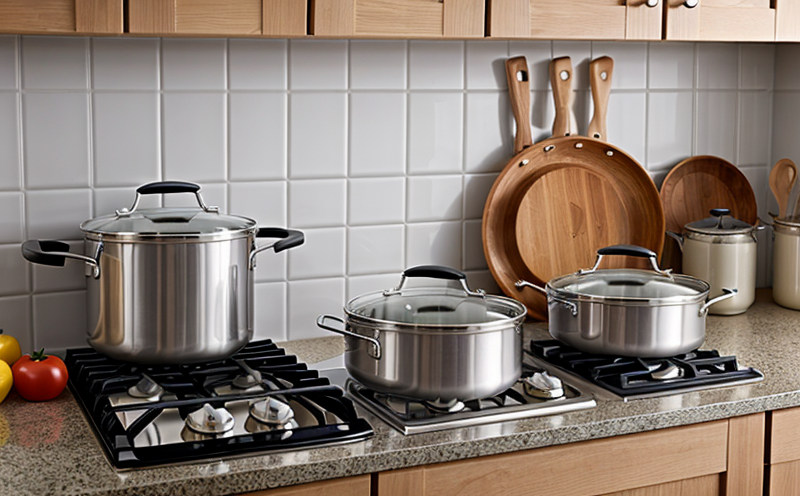Baking Performance Testing in Cookware
Baking is a critical process that requires specific properties from cookware to ensure successful outcomes. Baking performance testing in cookware evaluates how well the cookware retains heat, distributes it evenly, and allows for proper airflow during baking. This service ensures compliance with industry standards and consumer expectations, ensuring products perform as intended.
The test involves placing a standard baking sheet into an oven preheated to 200°C (392°F). The sheet is then held in the oven for 15 minutes while maintaining a temperature of 200°C. After this period, the temperature gradient across the baking sheet is measured using infrared thermography. This measurement provides insight into how well heat is distributed and retained within the cookware.
Another aspect involves measuring the thermal conductivity of the material used in the cookware. Thermal conductivity testing helps determine if the cookware can efficiently transfer heat from the oven to the food. This parameter is crucial for ensuring that baked goods are cooked evenly, enhancing both safety and quality standards.
The service also includes evaluating the non-stick properties of baking sheets, which are essential for preventing food from sticking during the baking process. Tests assess the durability of these non-stick coatings under various conditions to ensure they maintain their integrity throughout normal use.
Additionally, the testing covers the thermal expansion behavior of materials used in cookware. This characteristic is important because it affects how well the cookware retains its shape and performs over extended periods of high heat exposure without warping or deforming.
The service ensures that all these parameters meet specific criteria defined by industry standards such as ASTM D5470, which sets specifications for aluminum baking sheets. Compliance with these standards guarantees that consumers receive products that are safe, effective, and reliable.
For quality managers and compliance officers, this testing is vital in maintaining consistent product performance across batches. R&D engineers benefit from detailed insights into material properties and design improvements needed to meet market demands. Procurement teams can use the results of these tests to select suppliers who provide high-quality materials that adhere strictly to established specifications.
Why It Matters
Baking is a fundamental activity in many households, particularly for preparing breads and pastries. Properly performing baking relies heavily on the quality and characteristics of the cookware used. Ensuring the right temperature distribution within the oven can significantly impact the final product's texture and taste.
For instance, if the heat distribution is uneven, certain areas of the baked item might overcook while others remain undercooked. This inconsistency not only affects the aesthetic appeal but also poses potential health risks due to undercooked parts containing harmful bacteria. On the other hand, even heat distribution ensures that all components reach their required temperatures simultaneously, leading to safer and more palatable results.
Non-stick properties play a crucial role in preventing food adhesion, which is essential for easy cleaning after use. Poor non-stick performance could lead to burnt-on residues that are difficult to remove, increasing maintenance costs and reducing consumer satisfaction. Meeting industry standards helps manufacturers produce products that meet these expectations consistently.
The durability of baking sheets under repeated cycles of heating and cooling is another factor affecting long-term usage. Sheets that warp or deform over time may not function correctly during future uses. By adhering to rigorous testing protocols, we can ensure longevity and reliability, which are key factors in customer loyalty.
Applied Standards
| Standard | Description |
|---|---|
| ASTM D5470 | Sets specifications for aluminum baking sheets, including their physical dimensions and mechanical properties. |
| ISO 21938:2017 | Provides guidelines on the design of kitchen equipment for residential use, emphasizing safety aspects related to thermal performance. |
| EN 50642-1 | Defines requirements and test methods concerning the resistance to mechanical stress in domestic electrical appliances like ovens containing baking pans. |
| IEC 60309 | Sets out standards for plug and socket outlets, which can influence the performance of connected appliances including those used in baking processes. |
Industry Applications
- Bakery Operations: Ensures that commercial ovens provide consistent heat distribution across all baking pans, leading to uniform product quality.
- Home Appliances Manufacturing: Helps in developing new models of ovens and baking sheets with enhanced thermal efficiency and user-friendliness.
- Retail Stores & Online Platforms: Provides reassurance to customers about the reliability of products sold, thereby enhancing brand reputation.
- Agricultural Products Manufacturers: Ensures that packaging materials used for storing baked goods maintain appropriate temperatures during transit, preserving freshness and quality.
- Healthcare Facilities: Supports in providing safe environments by ensuring that all cooking equipment complies with strict hygiene regulations.





